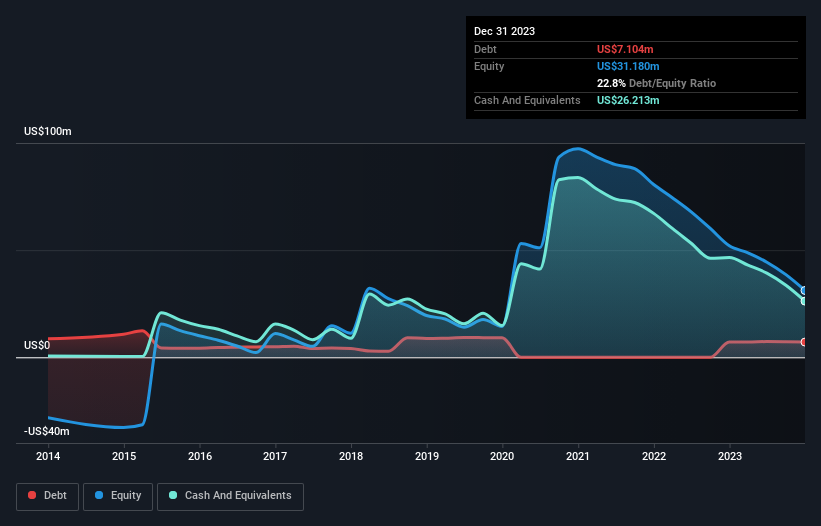Legendary fund manager Li Lu (who Charlie Munger backed) once said, 'The biggest investment risk is not the volatility of prices, but whether you will suffer a permanent loss of capital.' So it might be obvious that you need to consider debt, when you think about how risky any given stock is, because too much debt can sink a company. We can see that Profound Medical Corp. (TSE:PRN) does use debt in its business. But should shareholders be worried about its use of debt?
When Is Debt A Problem?
Generally speaking, debt only becomes a real problem when a company can't easily pay it off, either by raising capital or with its own cash flow. Ultimately, if the company can't fulfill its legal obligations to repay debt, shareholders could walk away with nothing. However, a more usual (but still expensive) situation is where a company must dilute shareholders at a cheap share price simply to get debt under control. Of course, plenty of companies use debt to fund growth, without any negative consequences. The first step when considering a company's debt levels is to consider its cash and debt together.
View our latest analysis for Profound Medical
What Is Profound Medical's Debt?
The chart below, which you can click on for greater detail, shows that Profound Medical had US$7.10m in debt in December 2023; about the same as the year before. However, its balance sheet shows it holds US$26.2m in cash, so it actually has US$19.1m net cash.

How Healthy Is Profound Medical's Balance Sheet?
According to the last reported balance sheet, Profound Medical had liabilities of US$6.37m due within 12 months, and liabilities of US$6.37m due beyond 12 months. On the other hand, it had cash of US$26.2m and US$7.29m worth of receivables due within a year. So it actually has US$20.8m more liquid assets than total liabilities.
This surplus suggests that Profound Medical has a conservative balance sheet, and could probably eliminate its debt without much difficulty. Simply put, the fact that Profound Medical has more cash than debt is arguably a good indication that it can manage its debt safely. The balance sheet is clearly the area to focus on when you are analysing debt. But ultimately the future profitability of the business will decide if Profound Medical can strengthen its balance sheet over time. So if you want to see what the professionals think, you might find this free report on analyst profit forecasts to be interesting.
Since Profound Medical doesn't have significant operating revenue, shareholders must hope it'll ramp sales of its new medical tech as soon as possible.
So How Risky Is Profound Medical?
By their very nature companies that are losing money are more risky than those with a long history of profitability. And we do note that Profound Medical had an earnings before interest and tax (EBIT) loss, over the last year. Indeed, in that time it burnt through US$22m of cash and made a loss of US$29m. But at least it has US$19.1m on the balance sheet to spend on growth, near-term. Even though its balance sheet seems sufficiently liquid, debt always makes us a little nervous if a company doesn't produce free cash flow regularly. There's no doubt that we learn most about debt from the balance sheet. But ultimately, every company can contain risks that exist outside of the balance sheet. For example, we've discovered 4 warning signs for Profound Medical (1 can't be ignored!) that you should be aware of before investing here.
If you're interested in investing in businesses that can grow profits without the burden of debt, then check out this free list of growing businesses that have net cash on the balance sheet.
New: Manage All Your Stock Portfolios in One Place
We've created the ultimate portfolio companion for stock investors, and it's free.
• Connect an unlimited number of Portfolios and see your total in one currency
• Be alerted to new Warning Signs or Risks via email or mobile
• Track the Fair Value of your stocks
Have feedback on this article? Concerned about the content? Get in touch with us directly. Alternatively, email editorial-team (at) simplywallst.com.
This article by Simply Wall St is general in nature. We provide commentary based on historical data and analyst forecasts only using an unbiased methodology and our articles are not intended to be financial advice. It does not constitute a recommendation to buy or sell any stock, and does not take account of your objectives, or your financial situation. We aim to bring you long-term focused analysis driven by fundamental data. Note that our analysis may not factor in the latest price-sensitive company announcements or qualitative material. Simply Wall St has no position in any stocks mentioned.
About TSX:PRN
Profound Medical
Operates as a commercial-stage medical device company that develops and markets incision-free therapeutic systems for the image guided ablation of diseased tissue in Canada, Germany, the United States, and Finland.
Adequate balance sheet with low risk.
Similar Companies
Market Insights
Community Narratives





